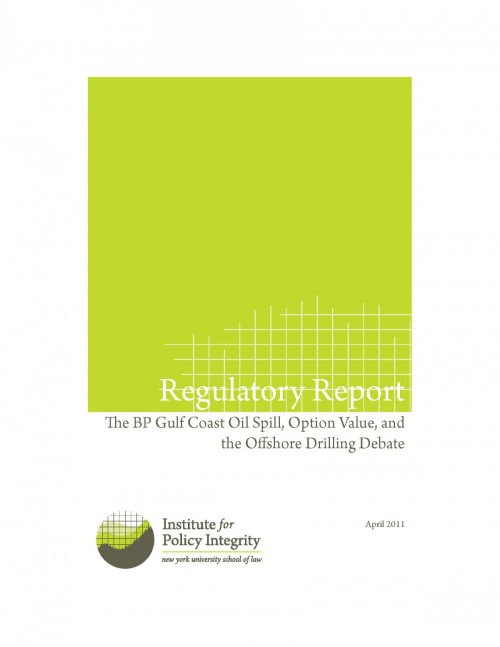-
NYC to phase out most-polluting heating oils
Mayor Bloomberg recently announced that the city will phase out the use of unrefined oil sludge and the most-polluting grades of heating oil, to be completed by 2030. The new rules target the airborne fine particulate matter from two grades of heating oil that when burned by buildings create more than 85% of the city’s heating oil soot emissions. It’s expected that 10,000 buildings will be affected, as the black smoke billowing from smokestacks that the city says is responsible for killing 3,000 residents each year is eliminated.
-

The BP Gulf Coast Oil Spill, Option Value and the Offshore Drilling Debate
One year after crude oil began gushing into the Gulf of Mexico, little action has been taken to prevent a similar disaster. A report authored by Gaia Larsen and Michael A. Livermore finds that overly simplistic economic analysis by the government may have helped lead to the accident.
-
Public Comments on Proposed PREA Standards
Today, Policy Integrity submitted comments to the Department of Justice (“DOJ”)on its notice of proposed national standards to detect, prevent, and reduce the incidence of sexual abuse in the nation’s prisons. The proposal implements the Prison Rape Elimination Act of 2003 (“PREA”), which created the National Prison Rape Elimination Commission to study of the impacts of sexual assault in the United States; standards ultimately suggested by the Commission inform much of the DOJ’s proposed rule.
-
Comments to Agencies on Retrospective Review
In addition to submissions to the Department of Energy and the Environmental Protection Agency, Policy Integrity also sent our recommendations on developing policies for conducting retrospective reviews to fourteen additional agencies this week, including the Department of the Interior (DOI), the Department of Justice (DOJ), the Small Business Administration (SBA), and the State Department.
-
Tracking Truckers’ Hours
Today, Policy Integrity submitted comments to the Department of Transportation’s Federal Motor Carrier Safety Administration.
-
Comments to EPA and DOE on Retrospective Review
Back in January, President Obama signed Executive Order 13,563 requesting that agencies develop and submit preliminary plans to periodically review existing significant regulations.
-
Letter to FCC On Creation of Trust Fund for Public Media
Today, Policy Integrity sent a letter to the Federal Communications Commission (FCC) on Obama’s plan for voluntary incentive auctions of noncommercial broadcast television spectrum. This plan would permit the FCC to conduct incentive-based auctions of unused broadband spectrum, making more airwaves available for wireless broadband services to prevent network congestion amid shooting demand for services such as mobile web surfing.
-
Letter to Obama Officals on the Social Cost of Carbon
Policy Integrity, along with a group of environmental organizations, sent a letter to government officials urging the Administration to fulfill its commitment to updating the Social Cost of Carbon (SCC) value to reflect improving science and economic understanding of climate change and its effects on society. Doing so can communicate to the public important information about the benefits of greenhouse gas reductions and show how the Administration frames the climate change issue and the values it brings to decision-making.
-
Public Comments on Truckers’ Hours of Service
Policy Integrity submitted comments on the Federal Motor Carrier Safety Association’s (“FMCSA”) proposed revisions to its hours of service regulation (“HOS regulation”) for commercial truck drivers. The regulation dates back to the Motor Carrier Act of 1935, which has seen little change to its basic structure despite numerous subsequent revisions. Our comments find FMCSA’s proposed modifications lacking for several reasons.
-
EPA Releases Second Prospective Study on Clean Air Act
The EPA released the third report in its series of cost-benefit analyses of the Clean Air Act today. Titled the Second Prospective Study, this report focuses on the effects of programs implemented after the 1990 amendments to the act.
